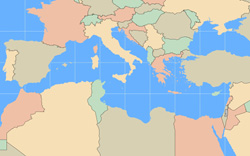A learning bridge between north and south
The EU has a large foothold on the Mediterranean, and economic success of these countries is crucial for stability, trade and cooperation. The EU-funded project 'Co-advising PhD for IT Research In the Mediterranean region' (CoAdvise) is strengthening collaborative research networks between Europe and Mediterranean Partner Countries (MPCs) in information and communication technology (ICT). It is focusing on the International Research Staff Exchange Scheme (IRSES), which fosters research and collaboration exchanges among PhD students from MPCs. The programme enables students to travel to Europe for three months for research and training, while European co-advisors have the chance to travel to an MPC one month a year. So far, the project has facilitated 108 months of secondments for 26 students from partner institutions out of the 201 originally planned. In addition, 11 co-advisors have already travelled to a partner institution in an MPC. This brings valuable opportunities for exchange and exposure, in both directions, encouraging different ways of thinking and operating. Networking on common research themes is enhanced, resulting in long-term collaboration as well. The project supports PhD student supervision and helps these students in writing their theses. It enables partner universities to boost exchanges with the EU and bridges education and knowledge transfer between north and south in ingenious ways. Moreover, numerous research topics have been explored under ICT, including hydrogeology, hydrodynamics, metaheuristics, environmental sustainability, robotics for medical purposes, scientific computing and voice simulation in disabled people. Students have written reports on their subjects and many have made published in scientific journals. More publications are expected as students get closer to completing their theses, an excellent indicator of project success. This is yet another good example of global cooperation that cements ties with regions around Europe.



